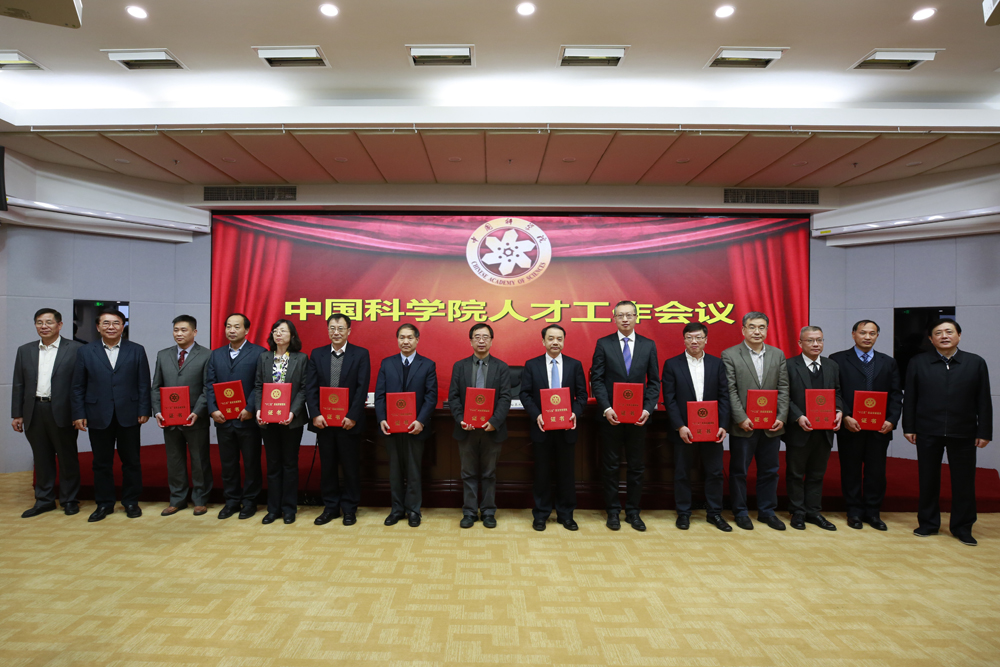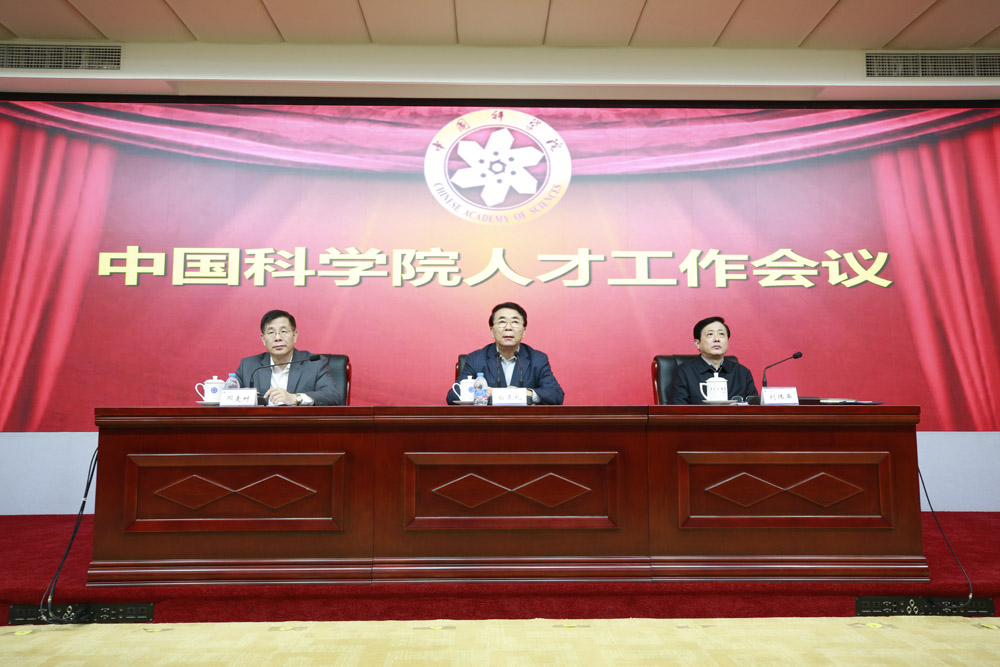


CAS honors the teams which made outstanding contributions to implementing the 12th Five-Year Plan (2011-2015). (IMAGE BY CAS)
The Chinese Academy of Sciences (CAS) held a meeting on talent development in Beijing on January 5.
The meeting underlined implementation of the central government’s requirements to deepen institutional reform to boost talent development and to adhere to the spirit of the national conference on science and technology innovation. It also introduced the CAS’s 13th Five-Year Plan (2016-2020) of building a talent highland and announced overall talent development plans for the same period.
CAS President Bai Chunli delivered an important speech clarifying the steps needed to implement the central government’s requirements, suggesting ways to improve the academy’s work in this field in the new age, and emphasizing development of a national highland for innovative talents.

Bai Chunli (C), President of CAS, addresses a meeting on talent development in Beijing, January 5, 2017. (IMAGE BY CAS)
To adapt to the new situation, meet external challenges and satisfy its own needs, CAS must prioritize talent development and earnestly implement Chinese President Xi Jinping’s requirement for the CAS to first of all strive to build a national highland for innovative talents, Bai said. CAS must make talent development a key strategy and continue to deepen reform of relevant systems and mechanisms to build high-level talent teams in science and technology as well as supportive and management fields.
Under the 13th Five-Year Plan, CAS will continue to deepen reform to create a favorable environment to nurture talents, he said. The academy will further delegate power to employment units and improve personnel management mechanisms. It will focus on the cultivation of young talents and improve supportive mechanisms, with the aim of establishing an orderly and reasonable human resources management system.
In his speech, Bai highlighted forming systematic, concerted and comprehensive policies to push forward the implementation of CAS’s 13th Five-Year Plan for building a talent highland. Through focusing on major science and technology plans and key areas, the academy will tap its advantages in platforms and systems, science and education integration and innovative culture to set up a unique framework to boost talent development.
The academy will enrich the philosophy of “putting people first”, working to ease restrictions on researchers and to provide them with more support in resolving their concerns. It will deepen its understanding of talent growth to offer appropriate support to various talents according to the characteristics and needs of their different developmental stages. It will coordinate expansion of various types of talents through better handling of the relationships between leading talents and younger ones, between researchers and engineers, and between newly arrived talents and ones who have been in place for some time.
Bai required that leaders at various levels make talent development a top priority and work harder to implement relevant institutional reforms. He urged all units affiliated to CAS to innovate management models and approaches in order to tap the full potential of various talents, while calling on scientists and technicians to maintain correct values, serve the people, be confident in advancing innovations, enhance their sense of responsibility, serve China’s overall development strategy, contribute to the country’s socio-economic development, and grow into the pillar force building China into a scientific and technological power in the world.
CAS Vice-President Liu Weiping delivered a report on CAS’s talent development. While hailing achievements under the 12th Five-Year Plan (2011-2015), the report also analyzed both talent competition at home and abroad and the challenges and problems the academy must face.
According to Liu, under the 13th Five-Year Plan, the academy’s effort to build a talent highland is concentrated on resolving problems, meeting the central government’s requirements, making innovations while passing on the legacy of previous achievements, and serving the country’s development goals and needs. The report highlighted major issues including fostering and introducing leading talents, supporting young talents’ development, cultivating and expanding research teams, and enhancing cooperation and sharing of talents and knowledge.
In his report, Liu also put forward specific measures with regard to improving and reforming talent management and cultivation mechanisms, optimizing incentive mechanisms and improving talent flow procedures.
Proposals were made in nine aspects:
(1) Enhancing comprehensive talent cultivation centered on key areas and major goals;
(2) Intensifying introduction of top-level and much-needed talents;
(3) Enhancing team building, science and technology cooperation and exchanges, and the sharing of talents and knowledge;
(4) Deepening reform of personnel systems to spur research institutes’ innovation vitality;
(5) Establishing a distribution and support system suitable for contemporary research institutes to ensure stable support levels;
(6) Creating conditions that boost the growth of young talents;
(7) Promoting internationalization of talents;
(8) Deepening integration of science and education, and improving the models for cultivating future talents;
(9) Streamlining administration and delegate power to allow CAS research institutes to make independent decisions concerning talent management.
Liu stressed that the academy should step up management, establish a personnel accountability mechanism, improve working mechanisms in talent development at its research institutes, innovate working measures and approaches, and push ahead with implementation of various reform measures.
Also at the meeting, CAS honored the teams with outstanding contributions to implementing the 12th Five-Year Plan, the winners of CAS Awards for Young Scientists in 2016, and the advanced units in personnel work and talent development.
The meeting was held via teleconferencing, with nearly 300 participants. The main venue was in Beijing and the sub-venues were in research institutes outside Beijing. It was hosted by CAS Secretary-General Deng Maicun.
Source: cas.cn